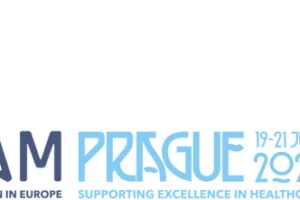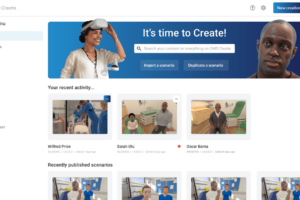Healthcare Simulation Webinars Focused on Debriefing
Debriefing healthcare simulation experiences is a crucial component of the methodology, which research suggests provides some of the greatest clinical education and training outcomes. As such, the HealthySimulation.com CE/CME LEARN platform has hosted numerous webinars by leading healthcare simulation experts on the debrief process. From selecting the appropriate debriefing technique to reviews of online and in-person courses, the exclusive webinars listed below showcase some of the best practices for medical simulation debriefing.
Creating a Psychologically Safe Space in Clinical Simulation (Mitzi Scotten, M.D.): From orientation to debrief, leverage the products, platforms and services in your sim center to provide the best possible outcomes for your learners. Hear from sim center education experts as they discuss the importance of proper planning and preparation to achieve successful execution and debriefing, not only for the clinical learner, but also the instructors within a healthcare simulation center. Learning objectives include:
- Learn how to create a standardized orientation to the simulation center prior to the first day of simulation training.
- Demonstrate using modeled physiology to drive scenarios and encourage the practice of human performance factors.
- Explain the importance of capturing productivity and efficiency in the simulation control room.
Debriefing Psychologically Stressful Simulations: A Different Perspective (Nicole Harder, PhD, RN): T here is a large body of research demonstrating that simulation-based education (SBE) is an effective method to prepare students and providers for clinical practice. The use of SBE is a viable pedagogical approach to increase feelings of preparedness specifically in end-of-life events. Despite this, there are no known SBE debriefing frameworks based on psychological safety that are purposely intended to debrief feelings and emotions following psychologically stressful SBEs. The purpose of this presentation is to report on a research study that developed a psychologically safe debriefing framework that helped students and newly graduated nurses to effectively process feelings and emotions following end-of-life simulation-based experiences (SBE). Given that SBE and associated learning outcomes have been shown to have a high degree of transferability to clinical settings, the development of a psychologically safe debriefing framework to prepare healthcare providers for the emotional/psychological issues that may be encountered after the death of a patient using SBEs was warranted and should be highly generalizable to the clinical setting. Learning objectives include:
Sponsored Content:
- Identify the components of a psychologically safe debriefing framework.
- Apply a psychological safe debriefing framework to emotionally or psychologically stressful simulation experiences.
- Summarize the research related to the application of a psychologically safe debriefing framework following and end-of-life simulation.
Healthcare Simulation Debriefing Strategies & Courses from Top Experts at The Debriefing Academy (Vincent Grant, MD & Adam Cheng, MD): This webinar will explore the complex journey of a clinical simulation debriefer as it relates to skill acquisition and the development of debriefing expertise. Several formal and informal opportunities for professional development in debriefing will be presented by two international experts in the art and science of debriefing with over 30 combined years of scholarship in debriefing and faculty development. This webinar is designed to share more about the Master Debriefer Course, which provides the advanced content, strategies and tools necessary to support the development of simulator educators within your program. This comprehensive course focuses on improving debriefing skills by exploring various important elements of debriefing, including: psychological safety, blended-method debriefing, learner-centered debriefing, co-facilitation, emotions in debriefing, peer feedback/coaching, cultural aspect of debriefing, cognitive load, difficult debriefing situations and faculty development. Learning Objectives:
- Describe the journey of debriefing professional development as it relates to skill acquisition and evolving expertise.
- Identify five strategies simulation programs can use to help build simulation educator skills within their program.
- Summarize opportunities for simulation educators to improve their debriefing expertise through offerings from The Debriefing Academy.
Exploring Self Debriefing and Group Debriefing in Clinical Simulation (Merveille Ndondo, BScN, RN, MN) There are many standardized debriefing methods in simulation. In an academic setting, simulation is usually run for novice learners. They come with little to no experience in their field of study and participate in simulation with knowledge gained from lectures and practice labs. Adding a self-debrief to a facilitated group-debrief was found to enhance students’ simulation experience. A mixed-method study was done on fourth-year baccalaureate nursing students and results will be shared in this presentation. Four themes will be discussed: psychological safety, learning, methodology, and reflection. Additional Presenters: Raquel Lashley-Trambulo, BScN, RN. Learning Objectives:
- Analyze how self-debriefing enhances self-awareness and reflection.
- Examine how psychological safety can be enhanced with self-debriefing prior to group-debriefing.
- Discuss how the use of combining debriefing formats can optimize learning after simulation.
Virtual Debriefing: Styles, Options, and Insights (Laura Gonzalez, PhD and Margaret Verkuyl, NP): Debriefing is integral to healthcare simulation. The traditional debrief provides nursing students, immediate feedback and valuable insight in a judgment-free environment. Over the past two years, virtual clinical simulation exploded as programs worked to meet clinical hours and fill in learning gaps. Yet, very little is known about debriefing virtual simulations, and INACSL’s Healthcare Standards of Best Practice for Simulation don’t fully address nuances such as debriefing in a synchronous or asynchronous modality. This webinar will compare debriefing options and provide valuable insight into the styles that best fit your learners’ needs, help you make the most of learner analytics, and provide tips for organizing different debriefing formats. Learning Objectives:
- Compare synchronous and asynchronous debriefing options for virtual simulation.
- Explain how to organize different types of debriefing formats.
- Evaluate debriefing formats to determine, the virtual simulation content and course learning outcomes, as well as evaluate how it meets learner needs.
Should We Use Video in Debriefing Practices? A Qualitative Study (Dr. Cheryl M. Miller, EDD, MSN, NPD-BC, CHSE): Learn the results of a qualitative multiple case study with embedded units that through observation, participant interviews, and documentation review sought to explore and describe practices of video-assisted debriefing (VAD) technology use in neonatal resuscitation program (NRP) education. Nursing Professional Development Specialists should consider incorporating innovative video technology use into their debriefing practices for review and observation in their courses. Leaders of simulation centers can also affect improvement in the safe use of VAD technology at their centers by applying the recommendations from this study. Learning Objectives:
Sponsored Content:
- Examine the benefits and pitfalls of the use of video assisted debriefing technology in simulation.
- Examine learner and instructor perceptions of the use of video-assisted debriefing technology.
- Apply study findings to own medical simulation practices.
Improv and In-Sim Debriefing: Kick Anxiety Out, Allow Learning In (Candace (Candy) Campbell, DNP, RN, CNL, CEP, LNC, FNAP): Since the early 2000’s, miscommunication in healthcare has been cited by the IOM and other studies as a major factor in causing medical errors, near-misses, and sentinel events. The method of clinical Simulation learning has been used to assist individuals and teams to learn, practice, and improve their clinical and communication skills. As a newer method, educators consistently reach for evidence of best practices to assist learners with the goal to improve team communication and increase patient safety. This presentation looks at the science behind behavioral learning and how improv can be utilized to overcome clinical training barriers. Learning Objectives:
- Restate the cognitive behavioral and neuroscience research relating to best learning practices.
- Explain the correlation between an atmosphere of safety and the ability to establish new patterns of self-confidence, trust and adaptability.
- Compare and contrast the In-Sim Debriefing vs Post-Sim Debriefing process and how it applies to clinical student learning.
Innovations in Simulation Debrief: A Two Phase Open Dialogue Model (Colleen Ryan, PhD, RN): Simulation is one way healthcare workers can learn skills to assist them in balancing conflicting priorities in contemporary health settings. Many simulationists will follow a structured approach or framework to facilitate the simulation debrief phase. These frameworks acknowledge that learning via simulation will mostly take place in the debrief phase. Thus, sufficient time for debrief needs to be allocated to facilitate learning. Research studies report inadequate debriefing of simulation participants causes harm; negating opportunities for quality learning. In 2017 a group of nursing simulationists at Central Queensland University, Australia, developed an innovative two-phase debriefing frame work.The framework originally involved two separate phases: first learners were provided time to explore emotions and feelings experienced during the simulation and second, learners spent time exploring individual and group clinical performances and developing new understandings. To facilitate the debrief simulationists had learnt a particular set of dialogical techniques. Student and academic participants in the evaluation phase of the project reported the language the simulation debriefers employed was more important to them than the two-phase debrief model. This presentation will introduce the audience to the two-phase model, the dialogical techniques employed and offer attendees take home exercises to learn and practice the dialogical techniques. Learning Objectives:
- Learn about the two-phase debrief model.
- Understand the importance of dialogical techniques in simulation debrief.
- Understand several dialogical techniques to assist in facilitating a simulation debrief.
Introducing INACSL’s New Simulation Standard: Prebriefing (Donna McDermott, PhD, RN, CHSE) In August of 2021 the new and updated Healthcare Simulation Standards of Best Practice (formerly known as the International Nursing Association of Clinical and Simulation Learning standards) were published. Included in this publication was a new standard: Prebriefing: Preparation and Briefing. Prebriefing ensures that learners are prepared for the educational content of a simulation and are also informed about the expectations of them during the simulation-based experience. Because the current literature refers to prebriefing as both preparatory activities and briefing activities, this new standard incorporates both as pre- simulation activities. Historically, the terminology related to prebriefing has varied and included numerous terms. The lack of consistency in terminology can create confusion for educators and simulationists. Standardization of terminology and methodology can help to create more standardization in future use. Learning Objectives:
- Discuss the importance of prebriefing in healthcare simulation.
- Describe the criteria and guidelines for the new prebriefing healthcare simulation standard.
- Describe how clinical simulationists can operationalize the prebriefing standard.
More About HealthySimulation.com Webinars
HealthySimulation.com’s streamlined clinical simulation LEARN CE/CME webinar platform launched in March of 2021, and has since featured some of the most consistent CE/CME healthcare simulation webinar content in the world! These webinars offer live and on-demand content from some of the world’s leading healthcare simulation experts, covering everything necessary to successfully start, develop or expand a clinical simulation program. Webinar topics range from audiovisual systems and recording, safe medication administration to moulage and manikin functions. Many HealthySimulation.com webinar presentations are recorded and viewable from anywhere at any time, learn more about signing up your department today!
Subscribe to the HealthySimulation.com LEARN CE/CME Platform!
Lance Baily, BA, EMT-B, is the Founder & CEO of HealthySimulation.com, which he started while serving as the Director of the Nevada System of Higher Education’s Clinical Simulation Center of Las Vegas back in 2010. Lance is also the Founder and acting Advisor to the Board of SimGHOSTS.org, the world’s only non-profit organization dedicated to supporting professionals operating healthcare simulation technologies. His co-edited Book: “Comprehensive Healthcare Simulation: Operations, Technology, and Innovative Practice” is cited as a key source for professional certification in the industry. Lance’s background also includes serving as a Simulation Technology Specialist for the LA Community College District, EMS fire fighting, Hollywood movie production, rescue diving, and global travel. He and his wife Abigail Baily, PhD live in Las Vegas, Nevada with their two amazing daughters.
Sponsored Content:

















